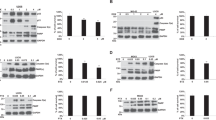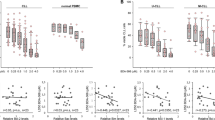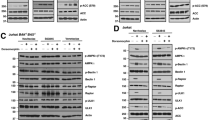Abstract
The effects of the protein kinase C (PKC) activator and down-regulator bryostatin 1 were examined with respect to paclitaxel-induced apoptosis and antiproliferative activity in human myeloid leukemia cells (U937) displaying enforced expression of the anti-apoptotic protein Bcl-xL. Overexpression of Bcl-xL blocked various aspects of paclitaxel-mediated apoptosis, including caspase-3 activation, degradation of poly(ADP-ribose) polymerase (PARP), loss of mitochondrial membrane potential (Δ Ψm), and release of cytochrome c. However, subsequent (but not prior) exposure of paclitaxel-treated U937/Bcl-xL cells (500 nM; 6 h) to bryostatin 1 (10 nM; 15 h) restored the extent of apoptosis, caspase activation, and mitochondrial damage to levels approximating those in paclitaxel-treated empty-vector control cells (U937/Neo). Potentiation of paclitaxel-induced apoptosis by bryostatin 1 in U937/Bcl-xL cells occurred primarily in the G2M cell population, and was associated with alterations in Bcl-xL gel mobility and a reduction in paclitaxel-mediated stimulation of CDK1 activity. Enhancement of paclitaxel-induced apoptosis by bryostatin 1 in Bcl-xL overexpressors was accompanied by a corresponding reduction in clonogenic potential. In contrast to its effects on apoptosis, bryostatin 1 failed to restore paclitaxel-mediated increases in free Bax levels in U937/Bcl-xL cells. Lastly, the actions of bryostatin 1 were mimicked by a pharmacologic inhibitor of the MEK1/MAP kinase pathway (PD98059), but not by SB203580, an inhibitor of p 38 MAP kinase. Moreover, sequential exposure of both U937/Neo or/Bcl-xL cells to paclitaxel followed by bryostatin 1 or PD98059 was associated with a net reduction in MAP kinase activity. Collectively, these findings indicate that protection against paclitaxel-mediated mitochondrial dysfunction and apoptosis in human U937 leukemia cells conferred by Bcl-xL overexpression can be substantially overcome by bryostatin 1 and possibly other agents that interrupt the MAP kinase signal transduction pathway.
This is a preview of subscription content, access via your institution
Access options
Subscribe to this journal
Receive 12 print issues and online access
$259.00 per year
only $21.58 per issue
Buy this article
- Purchase on Springer Link
- Instant access to full article PDF
Prices may be subject to local taxes which are calculated during checkout
Similar content being viewed by others
Author information
Authors and Affiliations
Rights and permissions
About this article
Cite this article
Wang, S., Wang, Z., Boise, L. et al. Bryostatin 1 enhances paclitaxel-induced mitochondrial dysfunction and apoptosis in human leukemia cells (U937) ectopically expressing Bcl-xL. Leukemia 13, 1564–1573 (1999). https://doi.org/10.1038/sj.leu.2401532
Received:
Accepted:
Published:
Issue Date:
DOI: https://doi.org/10.1038/sj.leu.2401532
Keywords
This article is cited by
-
Novel pathways of HIV latency reactivation revealed by integrated analysis of transcriptome and target profile of bryostatin
Scientific Reports (2020)
-
Unwinding the loop of Bcl-2 phosphorylation
Leukemia (2001)



